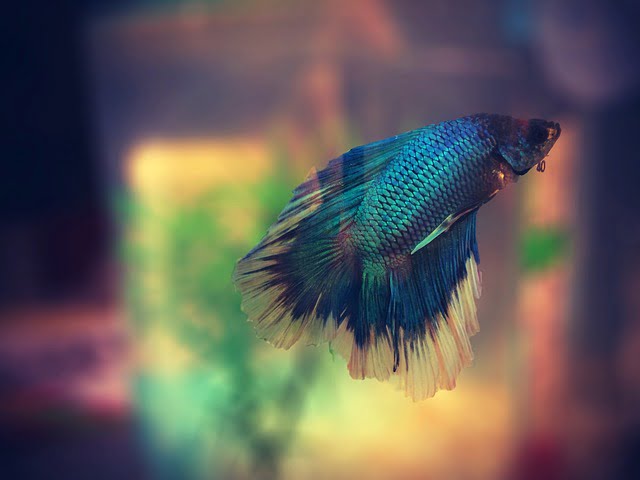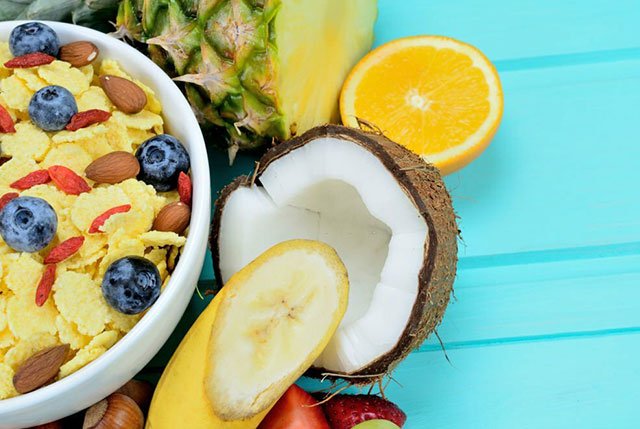Betta fish are one of the most popular pet fish species in the world. They are known for their vibrant colors, long fins, and unique personalities. However, many people are unsure what to feed their betta fish to keep them healthy and happy. One question that comes up frequently is whether betta fish can eat Aqueon tropical flakes.
Aqueon tropical flakes are a popular type of fish food that is designed for tropical fish species. They contain a variety of ingredients, including fish meal, wheat flour, soybean meal, and shrimp meal. While these ingredients are generally considered safe for betta fish, it is important to remember that bettas have specific nutritional needs that may not be met by a generic tropical fish food.
If you are considering feeding your betta fish Aqueon tropical flakes, it is important to do your research and make an informed decision. While these flakes may be a suitable option for some bettas, others may require a more specialized diet. In the next sections, we will explore the nutritional needs of betta fish and the potential benefits and drawbacks of feeding them Aqueon tropical flakes.

Understanding Betta Fish Diet
When it comes to feeding betta fish, it is important to understand their dietary needs. Betta fish are carnivorous and require a diet that is high in protein. In the wild, betta fish feed on insects, larvae, and small crustaceans.
In captivity, it is important to provide betta fish with a balanced diet that meets their nutritional requirements. Betta fish can be fed a variety of foods including pellets, frozen or live foods, and flakes.
However, not all types of fish food are suitable for betta fish. Some fish foods may contain fillers or ingredients that are not easily digestible by betta fish. In addition, some fish foods may not provide the necessary nutrients that betta fish need to stay healthy.
Aqueon tropical flakes are a popular type of fish food that is marketed for tropical fish. While these flakes may contain some of the nutrients that betta fish need, they may not be the best choice for a betta fish diet.
It is important to choose a fish food that is specifically formulated for betta fish. Betta fish require a diet that is high in protein and low in carbohydrates. A high-quality betta fish food will contain ingredients such as fish meal, shrimp meal, and krill meal.
In summary, understanding betta fish diet is important for providing them with a balanced and nutritious diet. While Aqueon tropical flakes may be suitable for some types of tropical fish, they may not be the best choice for betta fish. It is important to choose a high-quality betta fish food that meets their specific nutritional requirements.
Can Betta Fish Eat Aqueon Tropical Flakes?
We have received many questions about whether or not Betta fish can eat Aqueon Tropical Flakes. In this section, we will provide you with the information you need to make an informed decision.
Aqueon Tropical Flakes are a popular food choice for many tropical fish, including Betta fish. These flakes are made with high-quality ingredients and are designed to provide fish with the nutrients they need to stay healthy and vibrant.
That being said, Betta fish have a unique diet that consists mainly of protein-rich foods. While Aqueon Tropical Flakes do contain protein, they are not the primary source of protein that Betta fish need to thrive.
If you choose to feed your Betta fish Aqueon Tropical Flakes, we recommend supplementing their diet with other protein-rich foods such as frozen or live brine shrimp, bloodworms, or daphnia. This will ensure that your Betta fish are getting the nutrients they need to stay healthy and happy.
In summary, Betta fish can eat Aqueon Tropical Flakes, but they should not be the only food in their diet. A varied diet that includes protein-rich foods is essential to the health and well-being of Betta fish.

Nutritional Value of Aqueon Tropical Flakes
Aqueon Tropical Flakes are a popular choice of fish food among aquarium enthusiasts. These flakes are designed to provide a balanced diet for tropical fish, including betta fish. Here, we will take a closer look at the nutritional value of Aqueon Tropical Flakes.
Ingredients
The primary ingredients in Aqueon Tropical Flakes include fish meal, wheat flour, soy protein concentrate, and corn gluten meal. These ingredients provide a good source of protein, carbohydrates, and essential nutrients.
Nutritional Analysis
According to the Aqueon website, one serving of Aqueon Tropical Flakes (which is approximately 1 teaspoon or 2.2 grams) contains the following:
- Crude Protein: 41%
- Crude Fat: 7%
- Crude Fiber: 3%
- Moisture: 8%
- Phosphorus: 1.1%
- Vitamin C: 100 mg/kg
These values indicate that Aqueon Tropical Flakes are a good source of protein and contain a moderate amount of fat. The fiber content is also within a healthy range for fish food.
Additional Nutrients
In addition to the macronutrients listed above, Aqueon Tropical Flakes also contain a variety of essential vitamins and minerals that are important for fish health. These include:
- Vitamin A
- Vitamin D3
- Vitamin E
- Vitamin K
- Thiamine
- Riboflavin
- Niacin
- Vitamin B12
- Folic Acid
- Biotin
- Choline
- Calcium
- Phosphorus
- Potassium
- Magnesium
- Zinc
- Manganese
- Iron
- Copper
- Iodine
- Selenium
Overall, Aqueon Tropical Flakes provide a good balance of macronutrients and micronutrients that are important for the health and wellbeing of betta fish and other tropical fish.
How to Feed Aqueon Tropical Flakes to Betta Fish
When it comes to feeding your betta fish, it’s important to choose the right type of food that meets their nutritional needs. Aqueon Tropical Flakes is a popular choice among fish keepers, but can betta fish eat it? The answer is yes, but it’s important to feed it to them in the right way.
Here’s how to feed Aqueon Tropical Flakes to your betta fish:
- Start by selecting a high-quality Aqueon Tropical Flakes that contains all the necessary nutrients for your betta fish. Look for a product that is specifically formulated for tropical fish and contains protein-rich ingredients such as shrimp or krill.
- Feed your betta fish small amounts of Aqueon Tropical Flakes two to three times a day. Avoid overfeeding, as betta fish have a tendency to overeat and become overweight.
- Soak the flakes in a small amount of water for a few minutes before feeding them to your betta fish. This will help the flakes to soften and become easier for your betta fish to digest.
- Feed your betta fish only as much as they can eat in two to three minutes. Any leftover food should be removed from the tank to prevent it from fouling the water.
- Alternate Aqueon Tropical Flakes with other types of food to provide your betta fish with a varied diet. This can include freeze-dried or live foods such as brine shrimp, bloodworms, or daphnia.
By following these simple steps, you can ensure that your betta fish receives all the necessary nutrients from Aqueon Tropical Flakes without any adverse effects on their health.
Alternatives to Aqueon Tropical Flakes for Betta Fish
While Aqueon Tropical Flakes are a popular choice for feeding betta fish, there are many other options available that can provide a balanced and nutritious diet for your fish. Here are some alternatives to consider:
Pellets
Pellets are a great alternative to flakes as they sink to the bottom of the tank, making it easier for bettas to eat. They also come in a variety of sizes, making it easy to find the right size for your fish. Some popular brands of betta pellets include Omega One Betta Buffet Pellets, New Life Spectrum Betta Formula, and Hikari Betta Bio-Gold.
Freeze-Dried Foods
Freeze-dried foods are another option for betta fish and can provide a variety of nutrients. Some popular freeze-dried foods for bettas include bloodworms, brine shrimp, and daphnia. However, it’s important to note that freeze-dried foods should be soaked in water before feeding to prevent digestive issues.
Live Foods
Live foods can provide betta fish with a more natural diet and can be a fun way to add variety to their diet. Some popular live foods for bettas include brine shrimp, daphnia, and blackworms. However, it’s important to ensure that any live food is free of parasites and diseases before feeding to your fish.
Overall, there are many alternatives to Aqueon Tropical Flakes for feeding betta fish. It’s important to choose a balanced and nutritious diet for your fish to ensure their health and well-being.
Conclusion
Based on our research and observations, we conclude that betta fish can eat Aqueon Tropical Flakes. However, it is important to note that this should not be the primary diet of betta fish.
While Aqueon Tropical Flakes do contain some of the necessary nutrients for betta fish, they lack certain essential ingredients that are required for a balanced diet. Betta fish require a diet that is high in protein and fiber, and Aqueon Tropical Flakes do not meet these requirements.
Therefore, we recommend that betta fish owners use Aqueon Tropical Flakes as a supplement to a well-balanced diet that includes a variety of foods such as live or frozen brine shrimp, bloodworms, and daphnia.
It is also important to note that overfeeding betta fish can lead to health problems such as bloating and constipation. Therefore, it is recommended to feed betta fish small amounts of food two to three times a day, rather than one large meal.
Overall, while Aqueon Tropical Flakes can be a good addition to a betta fish’s diet, it should not be relied upon as the sole source of nutrition. As responsible pet owners, it is our duty to ensure that our betta fish receive a well-balanced and varied diet to maintain their health and longevity.

Frequently Asked Questions
What are the best foods to feed betta fish?
Betta fish are carnivorous and thrive on a diet of high protein foods. Some of the best foods to feed betta fish include pellets, freeze-dried or live foods such as brine shrimp, bloodworms, and daphnia. These foods provide essential nutrients and help maintain the health of your betta fish.
Can bettas eat TetraMin Tropical Flakes?
While TetraMin Tropical Flakes are a popular fish food, they are not the best choice for betta fish. Betta fish require a high protein diet, and TetraMin Tropical Flakes do not provide enough protein. Aqueon Tropical Flakes are a better choice for betta fish as they contain a higher percentage of protein.
What are some alternatives to Aqueon Tropical Flakes for betta fish?
There are several alternatives to Aqueon Tropical Flakes for betta fish, including Omega One Betta Buffet Flakes, Hikari Betta Bio-Gold, and Fluval Bug Bites Betta Formula. These foods provide a well-balanced diet for betta fish and contain essential nutrients.
What human foods can betta fish safely eat?
Betta fish should not be fed human foods on a regular basis. However, small amounts of boiled or blanched vegetables such as peas, spinach, and zucchini can be given as a treat. It is important to avoid feeding betta fish any food that is high in fat, salt, or sugar.
How often should I feed my betta fish?
Betta fish should be fed small amounts of food two to three times a day. Overfeeding can lead to health problems such as constipation and obesity. It is important to remove any uneaten food from the tank after feeding to prevent water quality issues.
Can other fish species eat tropical flakes?
Yes, other fish species can eat tropical flakes. However, it is important to choose a food that is appropriate for the specific species of fish. Some fish require a higher protein diet, while others may require a vegetarian diet. It is important to research the dietary requirements of your fish before choosing a food.











